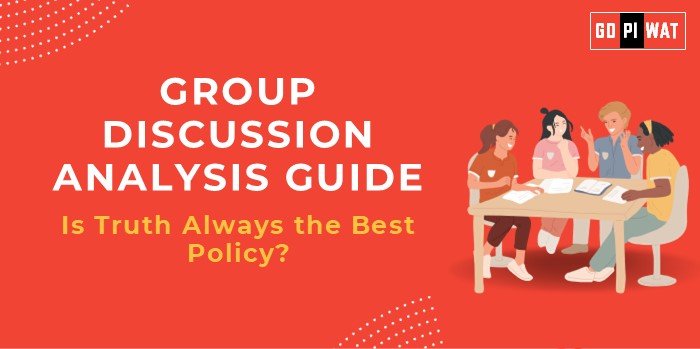📋 Group Discussion (GD) Analysis Guide: Is Truth Always the Best Policy?
🌐 Introduction to the Topic
Opening Context: “Is truth always the best policy?” is a timeless ethical dilemma, with profound relevance across personal, professional, and societal domains. The question challenges the absoluteness of truth, especially in situations where it may conflict with kindness, discretion, or safety.
Topic Background: Rooted in classical philosophy and reinforced by modern contexts, this topic has sparked debates since ancient thinkers like Aristotle and Kant discussed virtues and moral absolutism. Today, this debate gains new dimensions with the rise of social media misinformation, corporate ethics, and whistleblowing cases.
📊 Quick Facts and Key Statistics
- 💼 Workplace Honesty Cases: 35% of whistleblowers face retaliation (Source: Global Business Ethics Survey, 2023).
- 📉 Misinformation Spread: False news spreads 70% faster than truth on social media (Source: MIT, 2023).
- 🌍 Global Trust Index: Only 50% of citizens globally trust their governments to be truthful (Source: Edelman Trust Barometer, 2024).
- 🧠 Mental Health Impact: Honesty in relationships improves psychological well-being by 25% (Source: American Psychological Association, 2023).
🤝 Stakeholders and Their Roles
- 👥 Individuals: Uphold ethical standards in personal and professional settings.
- 🏢 Corporations: Balance transparency with discretion in sensitive matters.
- 🏛️ Governments: Maintain public trust through honesty while protecting national security.
- 📰 Media: Responsible for accurate and balanced reporting.
- 🌐 NGOs: Advocate for truth in areas like human rights and environmental transparency.
🏆 Achievements and Challenges
✨ Achievements:
- 📢 Corporate Whistleblowing Protections: Enhanced through laws like the U.S. Whistleblower Protection Act.
- 🖥️ Transparent Governance Models: Estonia’s e-governance builds citizen trust with public access to information.
- 📰 Successful Journalism: Investigative journalism has uncovered critical societal issues (e.g., Panama Papers).
⚠️ Challenges:
- 🤔 Ethical Dilemmas: Balancing truth with confidentiality in diplomacy or healthcare.
- 🌏 Cultural Contexts: Certain societies prioritize harmony over truth-telling, affecting policy uniformity.
- 📺 Media Integrity Issues: Commercial biases and sensationalism undermine truth.
🌍 Global Comparisons
Nordic Countries: Ranked highest in government transparency and citizen trust.
China: State-controlled narratives often prioritize stability over absolute truth.
Case Study:
– The Cambridge Analytica scandal showcased the consequences of misleading practices in data usage, raising questions about truth in digital ethics.
💬 Structured Arguments for Discussion
- ✅ Supporting Stance: “Truth fosters trust, transparency, and long-term success, making it indispensable in governance and business ethics.”
- ❌ Opposing Stance: “In some scenarios, unfiltered truth can lead to harm or conflict, necessitating discretion or strategic omission.”
- ⚖️ Balanced Perspective: “While truth is essential, its application must be contextual, balancing ethical responsibility and potential consequences.”
📖 Effective Discussion Approaches
- 💡 Opening Approaches:
- 📜 “Aristotle believed truth was a virtue, yet he acknowledged the need for balance in ethical dilemmas.”
- 📊 “Studies show falsehoods on social media spread faster, questioning the practical feasibility of absolute truth.”
- 📌 Counter-Argument Handling:
– Rebut data bias: “While unfiltered truth may hurt in the short term, long-term trust outweighs immediate fallout.”
– Use cases: “Countries like Sweden demonstrate how transparency strengthens public trust and governance.”
🔍 Strategic Analysis of Strengths and Weaknesses
- Strengths: Builds trust and long-term relationships, promotes accountability in governance and business.
- Weaknesses: Short-term conflicts or harm in sensitive contexts, cultural variations in the interpretation of truth.
- Opportunities: Use of AI for fact-checking in media, developing transparency frameworks in governance.
- Threats: Spread of misinformation, potential misuse of truth disclosures (e.g., espionage).
🏫 Connecting with B-School Applications
Real-World Applications:
– Ethics in leadership decision-making.
– Corporate strategies for managing crises through transparency.
📄 Sample Interview Questions:
- 💬 “Can complete transparency harm organizational goals?”
- 💡 “Discuss an instance where truth-telling led to unexpected consequences.”
Insights for B-School Students:
– Use this theme for project studies in ethical decision-making.
– Draw insights for leadership roles requiring diplomacy and discretion.


